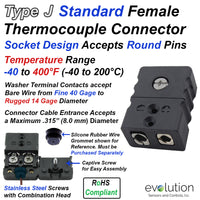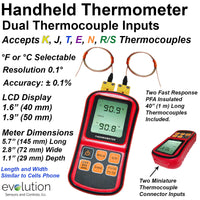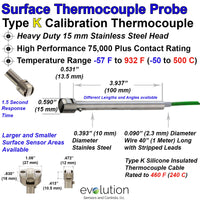Type J Thermocouples - Items tagged as "Lj-j"

Type J Thermocouples have excellent accuracy and stability in the temperature range of 212°F to 932°F (100 to 500°C) and are commonly utilized in the manufacturing, testing, and devlopment in the plastics industry, composites, electronics, inks, coatings and chemicals.
-
Recommended Temperature range is 32°F to 1400°F (0 to 750°C)
- Type J thermocouple alloys have the capability to measure from -346 to 2,192°F (-210 to 1200°C) although this expanded range negatively impacts the linearity (accuracy) sensitivity and the life span-repeatability
-
J Type thermocouples can have Excellent Linearity (stability) in the temperature range of 212°F to 932°F (100 to 500°C) with a deviation of approx. 1.5°F (0.5°C).
- Type J also has the second highest level of sensitivity with a 0.05 to 0.06 millivolt output per degree C.
- The Filter Search tool on the Left or the Clickable product categories below will aid in your selection of the Type J thermocouple products
- Type J Thermocouple Probes with a bendable metal stainless steel, Inconel or PFA protected metal sheath for immersion in liquids, gases, air and other industrial applications.
- J Type Beaded Thermocouples designs with fine diameter PFA and Fiberglass insulated lead wire with high flexibility and very fast response time.
- J Type Surface Thermocouples with stick on, and bolt-down versions along with handheld configurations for process equipment monitoring and control
- Type J Thermocouple Connectors include miniature, standard size, panel mounted, circuit board and other configurations available in thermoplastics, thermosets and ceramics.
-
Type J Thermocouple Wire with diameter and insulations from fine diameter 36 gage (.005") to rugged 20 Gage (.032") with Plastic Fluoropolymers to higher temperature Fiberglass and or with Metal Overbraiding.
-
Type J thermocouple alloys consist of Iron for the positive leg (magnetic) and Constantan (Copper Nickel alloy) for the negative leg. (non magnetic)
- The Iron leg is susceptible to oxidation and considerations must be taken especially at higher temperature or utilization of an exposed junction.
-
Color Codes - ANSI, IEC and JIS
- ANSI (American National Standard Institute) White positive, Red negative with Black or Black trace overall with wire and connectors.
- IEC ( International Electrotechnical Commission) Black positive, White negative and Black overall on wire and connectors
- JIS (Japanese Industrial Standard) Red positive, White negative, with Yellow or Yellow trace on wire and connectors
- Industry applications include the overall plastics processing industry including medical products, heat treating of aluminum, curing composites, manufacturing and developing chemicals, paints and other coatings, electronic and materials testing, along with overall research.







